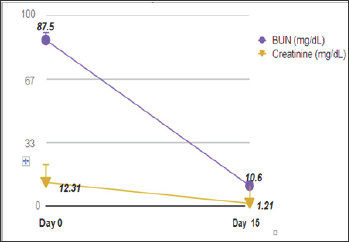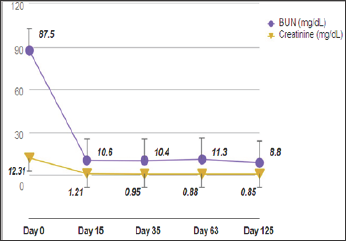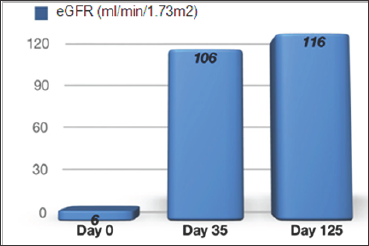Impact Factor : 0.548
- NLM ID: 101723284
- OCoLC: 999826537
- LCCN: 2017202541
Pilant AA*1, Wachirawich C1, Fonthip D1 and Yutthana AA2
Received: March 01, 2018; Published: March 20, 2018
*Corresponding author: Pilant Ananchaipatana Auitragoon, Bacteria and Virus Research Center, Mahachai, Samutsakorn, Thailand
DOI: 10.26717/BJSTR.2018.03.000872
Chronic kidney diseases and renal failure debilitate a person's health and compromised individual's performance to a great extent. Our research centre reports a case presented with renal failure, of which resumed normal functions after receiving an integrated approach to assist in restoring kidneys and maintain homeostasis. Such an approach employs a utilization of innovative methods for high-potency medicinal extracts along with patient's cooperation's in supportive dietary and lifestyle adjustments.
Keywords: Chronic kidney Disease; Renal Failure; Integrative Medicine
In present days there are increasing numbers of patients with debilitating kidney diseases especially those with acute and chronic renal failure, requiring dialysis. This poses a threat to national and global economy and efficiency at large, having more of the prominent working population being rather incapacitated through several weekly hospital visits; some of which requires adjustments to work life [1]. Patients with chronic kidney diseases and that undergoing kidney dialysis are inevitably presented with a much compromised health and physical as well as mental strength, thus impairing their performance as a whole. As a result, the Bacteria and Virus Research Center-Mahachai, is aware of such issue and has put much effort into research and development to help find reliefs for the aforementioned ailments. An integrated approach implementing innovative technologies attaining high-potency photo-extracts and immuno-therapeutic agents has been developed and specified as the Yod-Ying Protocol for kidney diseases (YP-kid).
The Yod-Ying Protocol for kidney diseases aims at assisting patients to gain more strength and vitality through supporting organ functions and proper waste drainage, thus bringing about functional homeostasis [2]. The protocol utilizes a few groups of high-potency medicinal extracts derived from photochemical and immune-therapeutic agents [3]. Along with the patient's cooperation's in dietary and lifestyle adjustments, The YP-kd consists of:
a. Dietary adjustments to control intake of protein to 40g/ day and heavy protein abstinence at dinner, to reduce workload on the kidneys and to avoid nocturnal over-accumulation of free ammonia by-products
b. Non-invasive removal of accumulated free ammonia,
c. Intakes of groups of high-potency photochemical extracts known to notify kidney functions [4].Strengthen renal infiltrative units [5]. And reduce elevated levels of BUN and creatinine [6].
d. Intakes of biomarker peptides to assist in reparative and strengthening functions of weakened kidney tissues [7,5]. Lifestyle adjustments with an abstinence from heavy alcohol drinking and cigarette smoking, and daily 30-minute heat therapy to induce perspiration, thus assisted waste reduction and removals.
We report a 31 year-old male case presented with renal failure, necessitating a 3-times-weekly haemodialysis. Prior to the beginning of the Yod-Ying Protocol, blood chemistry results were as followed: BUN = 87.5mg/dL, cretonne = 12.31mg/dL and eGFR = 6 ml/min/1.73m2. Moreover, there were evidence of blood and protein presented in urine (Table 1). As the treatment commenced, the patient followed strictly the Yod-Ying Protocol as described above for 2 months. A period of another 2 months was followed after the protocol was withdrawn to monitor kidney functions thereafter. Close monitoring of these kidney function tests was performed for the first month, second month and 2-month follow- up period afterwards, at every 2 weeks, 1 month and 2 months, respectively. It was reported that within 15 days of strict discipline according to the Yod-Ying protocol described, chemistry readings from kidney function tests revealed a considerable improvement, with values falling within normal range. BUN decreased to 10.6 mg/dL (87.89% reduction), and cretonne to 1.21 mg/dL (90.17% reduction) (Figure 1).
Figure 1: Kidney Function Test Results Return to Normal Values after 15 Days of Treatments.

Table 1: The Case's Kidney Function Tests and Urinalysis Prior to Treatments.

After 35 days of the protocol implemented, the case showed an evidence of resuming normal kidney functions with eGFR elevated to 106 ml/min/1.73m2; BUN reduced to 10.4 mg/dL and cretonne reduced to 0.95 mg/dL. These functional values continued to remain within the normal range throughout the treatments. Furthermore, from an initial presence of blood and protein in urine, these were not found at the end of the 2 months treatment duration (Table 2). Moreover as the protocol ended, the patient was followed up at 2 months post-treatment with repeated kidney function tests. The values of BUN and cretonne still remained within normal range 2 months thereafter (Figure 2). Means of BUN and cretonne from Day 15 to Day 125 were 10.28 mg/dL and 0.97 mg/dL, respectively (not shown). The value of eGFR from Day 0 at 6 ml/min/ 1.73m2 was also improved to 106 ml/min/1.73m2 and 116 ml/min/1.73m2 at Day 35 and Day 125, respectively (Figure 3).
Figure 2: Kidney Function Test Results Remained within Normal Range (with 2 Months Post Treatments).

Figure 3: Increased eGFR at The End of 1 and 4 months.

Table 2: Demonstration of Presence or Absence of Protein and Blood in Urine within 2-Month Treatments.

Chronic kidney diseases and renal failure can place a major burden to a patient's life and the lives of family members. The Yod- Ying Protocol aims at relieving the diseases by
a. Reducing workloads from heavy protein ingestion,
b. Assisting in proper waste drainage, and
c. Revitalizing kidney tissues and functions using high- potency extracts from well-selected Plants known to revive kidneys [8,9].
And reparative biomarkers peptides [7,10,11]. The protocol requires a patient's cooperation in adjusting his diet and lifestyles, as well as compliance in taking medicinal extracts on a rigorous basis. The case demonstrated improvements and normalized kidney functions from as early as 15 days of treatments, and continued throughout the 2-month treatments as well as other 2-month post treatments thereafter.
Factors contributing to such results may be due to the patient's age, early intervention and strict discipline in following the protocol, thus yielding a life-saving outcome. The case also indicated an abstinence from various other confounding factors such as physical and mental strains, heavy alcohol drinking and cigarette smoking. We conclude that kidney diseases and renal failure can be alleviated with an integrative approach, having a patient as the centre of treatments, cooperating and adjusting himself along with rigorously taking high-potency medicinal extracts derived from innovative technologies.
The authors would like to express our sincere gratitude's to Wiser W, the case mentioned herein for his willingness to participate and strictly follow the protocol; with autonomous written consent for disclosure of his case details to further benefit the world of medical development at large.


